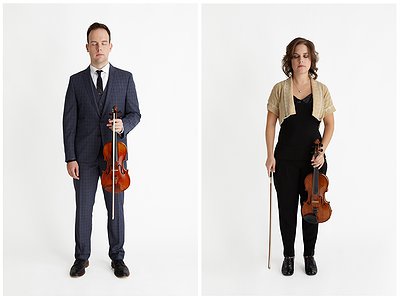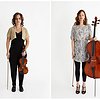In how much, do you feel, are creative decisions shaped by cultural differences – and in how much, vice versa, is the perception of music influenced by cultural differences?
Cultural differences matter a lot in both areas. How important music is in a certain culture, the extent to which there is an art music or folk or native pop tradition, must certainly change the perception of music, and whether or not someone brings expectations with them to a concert. Creative decisions are made largely in relation to the tradition each musician grows up in. With the access people have now to learning about musics from all over the world, it’s easier than ever to draw on many different cultural sources for creative inspiration. I think it’s important to know the tradition you are coming from, while keeping an open mind to any new artistic idea or direction that comes up.
What constitutes a good live performance in your opinion? What’s your approach to performing on stage?
A good performance for me is when I am fully wrapped up in the moment, totally entering a flow state, and having the audience join me. Mivos recently performed Lachenmann’s 3rd string quartet in Graz, Austria. If you know that piece, then you know it requires intense precision, concentration and attention to detail. It’s a piece that, to me, perfectly unites intellectual concerns of form and technique with extreme expressive power. We’ve performed the piece several times, and it’s always fun, but this recent performance was special. I could feel the audience coming along with us for the entire arch of the piece, I could enjoy each phrase as it happened. When we reached each emotional highpoint of the piece, it was literally hard for me to keep going. After the concert I had to calm down for a few minutes before seeing anyone. It was not a technically perfect rendering, at least on my end, but we reached that ecstatic state. So yeah, that was an example of a good show.
I want to have an open, confident and friendly vibe when I go on stage. The best way to achieve that is to simply be prepared.
The effect of a piece doesn't merely depend on the performance of the musicians, but also on the place it is performed at. How do you see the relationship between location and sound? In how far do you feel the current system of concert halls is still the right one for contemporary music in general?
To be honest, I think the performance is much more important than the location. It is important to consider the place, to know if you can play soft music or if amplification is needed and so on. As a performer, you of course have to adjust articulation, dynamics and tempo a bit depending on the acoustics of a space. But I think the different levels of formality all have their good and bad aspects and work for different types of pieces or programs – concert halls, gallery spaces and clubs/bars. I tend to prefer the middle ground level of gallery spaces, because the acoustics are usually good and the audiences tend to be attentive yet somewhat casual.
As Charles Rosen put, “the death of classical music is perhaps its oldest continuing tradition”. From your perspective, what are some of the root issues for what is generally referred to as the “crisis of classical music”, which also includes the scene for contemporary composition, and what, to you, are sensible ideas for improving it?
I know people talk about this a lot, but I’m never quite sure what they mean, and I haven’t read many articles in the subject. It’s clear that there are some problems in classical music. In the US, funding for the arts could and should be much higher. If American kids had more access to music and art education in public schools, awareness and interest in the arts would benefit greatly. Those two things would probably go a long way toward fixing whatever else might be a problem – struggling orchestras, dwindling publics, and just a basic lack of interest. Contemporary music is a bit different. I’m probably a bit naive, but I feel a lot of excitement and innovation surrounding new music, and there’s a lot of room for growth. There are great musicians and composers all over the world with interesting, cross-pollinating aesthetic movements. I feel very optimistic about the future of new music.
Music-sharing sites and -blogs as well as a flood of releases and concerts in general are presenting both listeners and artists with challenging questions. What's your view on the value of music today? In what way does the abundance of music change our perception of it?
It’s a double-edged sword. Having access to so much variety so easily is great for the curious listener. As artists, our primary goal is to communicate our artistic vision to as broad an audience as possible, and the music-sharing phenomenon helps artists create a community around their work that can stretch across continents. The biggest downside is that people now expect music and art in general to be free. If art is ubiquitous, never curated and never paid for, people will value it less and take art less seriously in general. Art doesn’t have to be “serious” to be good, put people should at least accept the fact that good art exists and has intrinsic value. It’s a fine line to distinguish, but artists need to be thoughtful about how they share their music and not just give everything away.
Many artists are finding it hard to secure a living with their music. What are the financial realities you're living with and in which way, do you feel, could they be improved?
Making a living as an artist is never easy. We’ve been fortunate in Mivos that our hard work toward establishing the quartet has really started to pay off. We’re not wealthy by any means, but we are becoming more stable. For us, the main financial reality is that we need to tour regularly, and we’re doing that. Our seasons grow every year. Living in New York is fantastic and very important to our career at the moment, but the cost of living is extremely high. I’m not sure what can be done about that, but I hope that our new mayor’s focus on economic inequality leads to some improvement. Again, a higher percentage of arts funding in the US would really help all artists in the country.
Reaching audiences usually involves reaching out to the press and possibly working with a PR company. What's your perspective on the promo system? In which way do music journalism and PR companies change the way music is perceived by the public?
Hiring a PR company in New York is very expensive. I’m sure that they do good work, but we usually can’t afford them. It’s simple to build a list of press contacts, and the current wave of blogs, websites and e-zines are a great resource. Intelligent, articulate reviewers are also a great resource. Having curators that you know and trust is so helpful in the midst of the intense media saturation many people face.
Usually, it is considered that it is the job of the artist to win over an audience. But listening is also an active, rather than just a passive process. How do you see the role of the listener in the musical communication process?
All a listener really needs to do is be interested enough in music to attend the concert in the first place, and to come with a sincerely open mind. I think it’s generally just good for people to have intellectual, aesthetic curiosity, and to want to cultivate it. The rest is up to the artists.
Visit the Mivos Quartet online at www.mivosquartet.com



